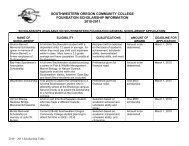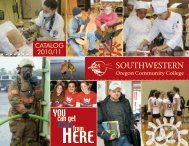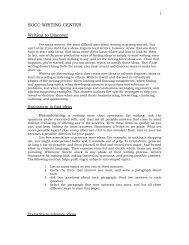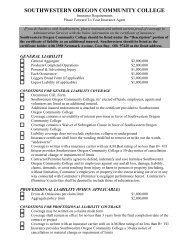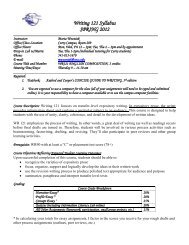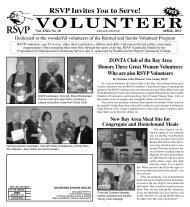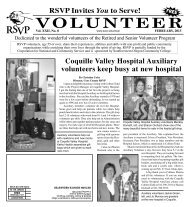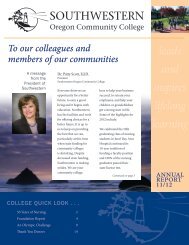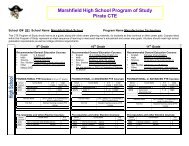Part 1 3.7.qxp - Southwestern Oregon Community College
Part 1 3.7.qxp - Southwestern Oregon Community College
Part 1 3.7.qxp - Southwestern Oregon Community College
You also want an ePaper? Increase the reach of your titles
YUMPU automatically turns print PDFs into web optimized ePapers that Google loves.
Course Descriptions<br />
MUS213 Music Theory II<br />
3 credits (3 lec hrs/wk)<br />
A study of polyphony, counterpoint, extended and<br />
chromatically altered chords, and 20th century<br />
composition.<br />
Prerequisite: MUS212.<br />
Concurrent: MUS116<br />
MUS261/262/263 Music History I, II, III<br />
3 credits/term (3 lec hrs/wk)<br />
A study of history concentrating on the life and times of<br />
composers and their music. Attention will be given to the<br />
change forms and styles of music combined with a wide<br />
range of listening. History will be divided into three<br />
sections: 1) Early Music, Renaissance, Baroque-350<br />
to 1750; 2) Classical and Romantic-1750 to 1900;<br />
3) Contemporary-1990 to present.<br />
NURSING<br />
NRS110 Fundamentals of Nursing - Health<br />
Promotions<br />
9 credits (5 lec, 9 lab, 2 lec-lab hrs/wk)<br />
This course introduces the learner to framework of the<br />
<strong>Oregon</strong> Consortium for Nursing Education (OCNE)<br />
curriculum The emphasis on health promotion across<br />
the lifespan includes learning about self-health as well as<br />
client health practices. To support self and client health<br />
practices, students learn to access research<br />
evidence about healthy lifestyle patterns and risk factors<br />
for disease/illness, apply growth and development theory,<br />
interview clients in a culturally sensitive manner, work as<br />
members of the interdisciplinary team giving and<br />
receiving feedback about performance, and use reflective<br />
thinking about their practice as nursing students. The<br />
family experiencing a normal pregnancy is a major<br />
exemplar. Includes classroom, lab/clinical and lecture/lab<br />
learning experiences. This course will also cover content<br />
related to providing an overview of the health care<br />
system, role of health care professional and<br />
paraprofessionals, and skills provided to clients in<br />
acute and extended care facilities. Students will learn<br />
how to modify skills to meet the needs of acute and<br />
chronic patients.<br />
Prerequisite: Minimum of 49 prerequisite credits with a<br />
2.75 GPA or higher and admission to the Nursing<br />
Program.<br />
NRS111 Foundations of Nursing in Chronic Illness I<br />
6 credits (3 lec, 6 lab hrs/wk)<br />
This course introduces assessment and common<br />
interventions (including technical procedures) for clients<br />
with chronic illnesses common across the lifespan in<br />
major ethnic groups. The client and family’s “lived<br />
experience” of the illness, coupled with clinical practice<br />
guidelines and extant research evidence is used to guide<br />
clinical judgments in care to the chronically ill. Roles of<br />
multidisciplinary team in care of the chronically ill, and<br />
legal aspects of delegations are explored. Through case<br />
scenarios, cultural, ethical, health policy, and health care<br />
delivery system issues are explored in the context of<br />
the chronic illness care. Case exemplars include<br />
children with asthma, adolescent depression, adult-onset<br />
diabetes, and older adults with dementia. Includes<br />
classroom and clinical learning experiences.<br />
Prerequisite: NRS110 with a “C” or better.<br />
Concurrent: NRS230 and NRS232.<br />
NRS112 Foundations of Nursing in Acute Care I<br />
6 credits (3 lec, 6 lab hrs/wk)<br />
This course introduces the learner to assessment and<br />
common interventions (including relevant technical<br />
procedures) for care of patients during an acute episode<br />
of disease/illness. Disease/illness trajectories and<br />
their translation into clinical practice guidelines and/or<br />
standard procedures are considered in relation to<br />
their impact on providing culturally sensitive,<br />
client-centered care. Includes classroom and clinical<br />
learning experiences.<br />
Prerequisite: NRS111, NRS230 and NRS232 with a “C”<br />
or better.<br />
Concurrent: NRS231and NRS233.<br />
NRS221 Foundations of Nursing in Chronic Illness II<br />
and End-of-Life<br />
9 credits (4 lec, 9 lab, 4 lec-lab hrs/wk)<br />
This course builds on Foundations of Nursing in Chronic<br />
Illness I. The evidence base related to family care<br />
giving and symptom management is a major focus and<br />
basis for nursing interventions with patients and families.<br />
Ethical issues related to advocacy, self-determination,<br />
and autonomy are explored. Complex skills<br />
associated with symptom management, negotiating in<br />
interdisciplinary teams, and the impact of cultural<br />
beliefs are included in the context of client and<br />
family-centered care. Exemplars include patients with<br />
chronic mental illness as well as other chronic<br />
conditions and disabilities affecting functional status and<br />
family relationships. Includes classroom and clinical<br />
learning experiences.<br />
Prerequisite: NRS222 with a “C” or better.<br />
<strong>Southwestern</strong> <strong>Oregon</strong> <strong>Community</strong> <strong>College</strong> 2006-07 Catalog www.socc.edu Course Descriptions 191



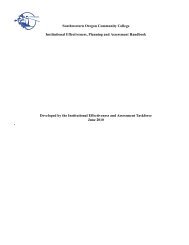
![SWOCC Viewbook [PDF] - Southwestern Oregon Community College](https://img.yumpu.com/26373688/1/190x245/swocc-viewbook-pdf-southwestern-oregon-community-college.jpg?quality=85)

